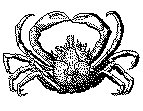
When I was a child, I saw an extraordinary thing one day at the beach. My family and I were vacationing at a remote island in the Pacific Ocean, and we spent a leisurely day on a quiet, uninhabited beach. I sat by myself on a part of the beach populated by a whole colony of sand crabs. These little crabs lived in holes in the sand that each crab dug for itself, and at any sign of movement, the crabs would scurry quickly down into their holes for safety.
I observed one of the crabs moving sand with its claw with absent-minded proficiency, and I was mesmerized to see the effortless way it obtained a scoop of sand and lifted it into the air. This activity looked like so much fun to me that I made a similar ball of sand and playfully tossed it over towards some crabs. The sand ball I tossed actually HIT an unsuspecting crab, who immediately scooped up a ball of sand and held it aloft while standing as high on its back legs as possible... looking as tense and concerned as a crab can look, as moist grains of sand from the sand ball I'd just tossed still clung to it's shell.
The crab continued standing up high on its back legs as it carefully surveyed the entire area, assessing all the crabs in the vicinity to determine who might have been the one to toss the sand ball. After several long moments of careful consideration, the crab steadied itself as it fixed its gaze on one particular crab. It suddenly flung its ball of sand at this unsuspecting crab, who it hit with incredible precision! The targeted crab immediately scooped up a ball of sand and returned fire.
In a matter of minutes, a dozen little crabs were all flinging sand balls at one another with reckless abandon... none of the crabs suspecting that the perpetrator of the whole sand ball fracas was not a crab at all, but a human.
My experience with these sand crabs shows me that crabs interpret what happens to them in terms they can understand, which may not be the truest sense of what is actually happening. We humans are not so different from crabs, in the sense that we also are only capable of interpreting experience based on what we KNOW of reality. Some forces are simply outside our realm of comprehension. The sand crabs had no prior knowledge of humans, so they did not imagine for a minute that I might have been the one who threw the first sand ball, although my interaction with them had the effect of moving almost every single crab on the beach into action.
We are very likely living within a conceptualization of a universe of which we have only a very limited understanding, just like the crabs on the beach had no understanding of how anything besides another crab could possibly throw a ball of sand. We have something in common with those crabs, since we usually only consider other human beings like ourselves to be responsible for affecting our lives. When Captain Cook's sailing ship first approached the island of Tahiti in the South Pacific, it was literally not noticed by the inhabitants, even when Captain Cook and his crew pointed it out tot hem, since the Tahitians had never seen such a vessel before. Just as Captain Cook's ship was invisible to the Tahitians, I was invisible to the sand crabs on the beach. We can't really contemplate what we have no comprehension of, even if it is right in front of us. The range of our knowledge of reality is limited by our pre-existing beliefs, assumptions, and expectations.
Excerpted from Cynthia Sue Larson's forthcoming book, "Reality Shifts: When Consciousness Changes the Physical World"
Home
/ News / Articles
/ Bookshelf
Your
Stories